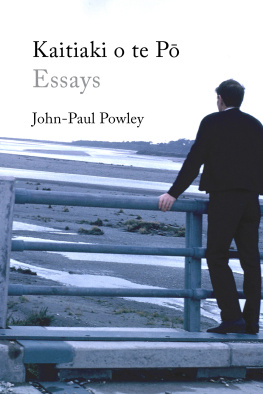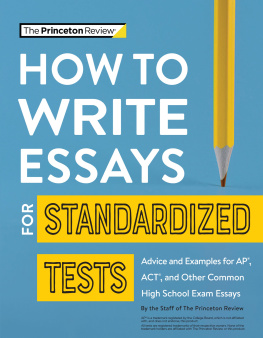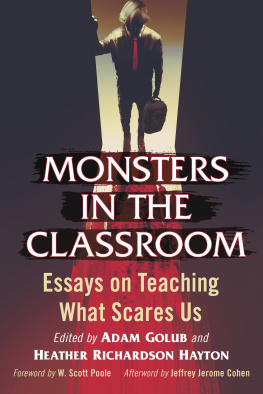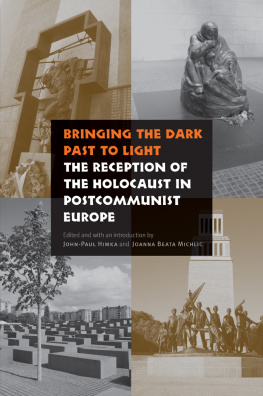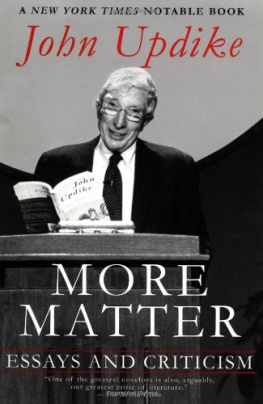


Some of these essays have previously been published in earlier forms in JAAM, Headland, The Spinoff and on the authors blog, Man of Errors.
The names of all students mentioned in these essays have been changed.
Seraph Press
PO Box 25239
Wellington 6146
New Zealand
www.seraphpress.co.nz
First published 2018
John-Paul Powley 2018
ISBN 978-0-9941345-9-2 (print)
ISBN 978-0-9951082-1-9 (EPUB)
ISBN 978-0-9951082-2-6 (Kindle)
This book is copyright. Apart from any fair dealing for the purpose of review, private research, and criticism as permitted under the Copyright Act, no part may be reproduced without written permission from the author.
Designed and typeset by Helen Rickerby
Ebook conversion 2018 by meBooks
For Jean, Wendy, Cathy, Eleanor, Rosamund
and Dad
Contents
What trauma does sometimes, for people, is that it really focuses them on the past; they have a lot of trouble staying in the present.
Rachel Yehuda
Here at the age of thirty-nine I began to be old.
On Sunday night I had a dream about my friend Matt, who died suddenly of a heart attack in May. In my dream I was looking for a letter he had sent me that had something important in it, but I couldnt find the letter. As is the way with these kinds of dreams, there was this sense that my goal was always just around the next corner, so I seemed to endlessly move closer to what I wanted but never quite reach it. This was not the first time that I have dreamed about Matt since he died, and so far these dreams have not been happy dreams because they always have left me feeling weighed down with sadness.
On Monday morning then, I woke in a flat mood, and found myself standing at the kitchen window after breakfast watching an empty chippie packet blowing around the garden. When youre down, empty chippie packets blowing around gardens seem like handy metaphors for life. On the other hand, it is usually better to go and put the chippie packet in the bin rather than construct metaphors about life.
Monday and Tuesday I had a history teachers conference. I drove Cathy and Rosamund up to Victoria University and dropped them off before I parked the car in the university car park. Walking through Victoria University, it seemed like quite a different place from the place I had studied at in the early 90s: new buildings, new configurations of old buildings, and some of the familiar places too. It was a little unsettling. I was very young in that place, and have a lot of strong memories of people I knew then, as they were then, in those places, and seeing so many of those places changed sent a ripple through my past.
Probably it was my mood, but when I rounded a corner of the Hunter Building and saw a funny little statue, I was suddenly transported across the intervening two decades to a time when I vividly remembered standing by that statue with some friends. Its rather an odd statue; a naked man holding a baby a little too casually in one arm, and the whole clay surface of baby and man handled roughly, like it was rendered with a butter knife. It is not particularly beautiful, but I was pleased to see it. And sad. The John-Paul who walked past that statue so many times twenty years ago is long gone, and so, sadly, is one of the friends.
There is a small, historic cemetery just across from the Hunter Building. A handful of gravestones lurch about on a wooded hill that looks down over the city and the harbour. It is a good spot, when you are twenty, to sit, and smoke, and contemplate the meaning of life. As I get older I become sensitive to the accumulation of memories, and the people in them. Although I have no belief in an afterlife, I become increasingly sympathetic to parts of the Mori view that we have a duty to the dead, that they live in us, and that we carry each other forward into the future through memory and stories.
* * *
The first day of the history conference was not good. Our Minister of Education spoke for thirty minutes. She had a pre-prepared speech, which she waved at us and told us was terrific, but which she clearly had not written, and only read a couple of bits of. She spoke rapidly, and sometimes incoherently, sometimes retreading parts of her life story at school (I had read it already on her website), and sometimes giving us the party political message on education. She appeared to be a person who hadnt spent a lot of time listening to other people, but was very enthused by her own story.
After that we had three more presentations which left me cold, or simply bored. I was able to cover three pages of my notebook in doodling.
* * *
In the evening I watched Brideshead Revisited again with Cathy.
Here at the age of thirty-nine I began to be old. I felt stiff and weary in the evenings and reluctant to go out of camp; I developed proprietary claims to certain chairs and newspapers Here my last love died.
That is how Brideshead Revisited begins. In the past these lines, and the beginning phrases, played like a sad but lovely refrain something like a piece for piano by Debussy but now I find it all a little more discordant, and the first line in particular quite jarring. It is as if I put on a record expecting Chopins nocturnes and got Stravinsky at his most stridently discordant.
Not of course that things are quite as bad as all that my last love hasnt died but I am thirty-nine and I have begun to feel a little stiff and weary. I find that I make quite extraordinary noises when I stand up now after chasing some toy that has skittered into the furthermost corner under the couch; that there is some creaking and exhalation as I attempt to clamber from the floor to my full modest height again. I also look forward to Friday nights and the couch and the TV and a glass of wine a little too much probably. Having been denied those things all week by the need to work, I sink with gratitude into my corner of cushions, laugh at Graham Norton on the telly, and then fall asleep until Cathy prods me awake and I lumber into bed.
My feeling of discomfit is not improved as Brideshead progresses.
I had been there before; first with Sebastian more than twenty years ago on a cloudless day in June, when the ditches were creamy with meadowsweet and the air heavy with all the scents of summer.
More than two decades ago I started university, and exactly twenty years ago I met Matt. At the end of 1993 he left for England to join his parents and get a job, and I see, looking at the inside covers of some books, that it was in 1993 that I read, for the first time, The Picture of Dorian Grey and Brideshead Revisited. It was also in the summer of 19931994 that some friends and I started a writing group, and I wrote a story called The Hazey Days, which was really my version of myself and my friends, and which I thought for a long time would be my first novel.
We lit fat, Turkish cigarettes and lay on our backs, Sebastians eyes on the leaves above him, mine on his profile, while the blue-grey smoke rose, untroubled by any wind, to the blue-green shadows of foliage, and the sweet scent of the tobacco merged with the sweet summer scents around us and the fumes of the sweet, golden wine seemed to lift us a fingers breadth above the turf and hold us suspended.
Next page
